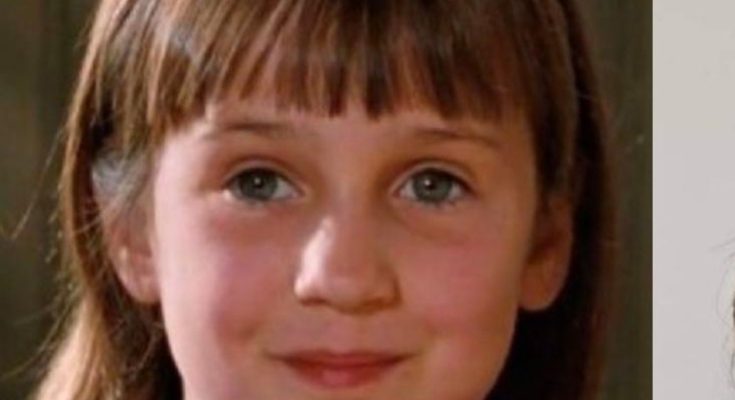Mara, who recently turned 37 on July 24, seemed like she was on her way to big things in Hollywood. But as she got older, she lost what many people considered her “cute” factor, and her opportunities in the film industry dwindled. Reflecting on her career, Mara said, “If you’re not cute anymore, if you’re not beautiful, then you are worthless. Hollywood was burned out on me.”
The Rise of a Young Star
Mara’s journey in Hollywood began when she was very young. In 1993, at just five years old, she landed the role of Natalie Hillard, Robin Williams’ youngest daughter in Mrs. Doubtfire. Her performance was memorable, and Mara won over the hearts of millions of fans around the world. Before her big screen debut, she had already appeared in several commercials, giving her experience in front of the camera and helping her transition to larger roles.
Even at the peak of her early fame, Mara’s parents did their best to keep her grounded. She recalls, “My parents were proud of me, but they still grounded me if needed.” Her mother often reminded her, “You’re just an actor, and you’re just a kid,” if Mara ever let the success get to her head.
After Mrs. Doubtfire, Mara was cast in Miracle on 34th Street (1994), playing Susan Walker, the same character originally portrayed by Natalie Wood in the 1947 classic. Mara shared her audition experience in an essay for the Guardian: “I read my lines for the production team and told them I didn’t believe in Santa Claus. But I did believe in the tooth fairy, and I had named mine after Sally Field,” she wrote, referring to her co-star in Mrs. Doubtfire.
The Challenges of Fame
In 1996, Mara took on one of her most iconic roles—Matilda Wormwood in the film adaptation of Matilda. She starred alongside Danny DeVito and Rhea Perlman, who played her neglectful parents. Her portrayal of Matilda—a smart, magical girl who finds her own strength—resonated with audiences and cemented Mara as a beloved child star.
However, 1996 was also a difficult year for Mara. Her mother, Suzie, passed away from breast cancer, leaving Mara devastated. Reflecting on the loss, Mara said, “I wasn’t really sure of my identity. I felt like two different people before and after that.” Her mother was a major part of her life, and losing her at such a young age left Mara struggling to find herself. “I found it overwhelming. I just wanted to be a normal kid, especially after my mom passed,” she added.
Though Mara was gaining recognition, she found herself feeling deeply unhappy and exhausted. “I was the most unhappy when I was very famous,” Mara admitted. The pressures of fame and the expectations placed on her as a young actress took a toll on her mental health.
Stepping Away from Acting
At age 11, Mara reluctantly accepted her final major film role in Thomas and the Magic Railroad (2000). Even at that young age, she felt disconnected from the roles she was offered. “The characters felt too young, and I reacted viscerally to the writing. I remember thinking, ugh, I don’t love this,” she shared.
Eventually, Mara decided to leave Hollywood, but it wasn’t an easy choice. As she entered her teenage years, Mara began to outgrow the “cute” image that had defined her early career. The roles that once came easily were no longer available. She described herself during this time as “just another weird, nerdy, loud girl with bad hair and teeth, whose bra strap was always showing.”
“When I was thirteen, nobody complimented my looks anymore or called me cute—at least not in a flattering way,” she explained. The lack of appreciation for her changing appearance, along with the pressures of fame, had a profound impact on her. “I had this Hollywood notion that if you’re not attractive or cute anymore, you’re worthless. I connected that directly to my career’s end,” she said. Even though she was tired of Hollywood, the rejection still hurt. “Hollywood was burned out on me, and I was burned out on it.”
A New Chapter as an Author
After leaving acting, Mara found fulfillment in writing. In 2016, she published her first book, Where Am I Now?: True Stories of Girlhood and Accidental Fame. The memoir explored her journey from being a child star to finding happiness in a quieter, more private life. It touched on her experiences growing up on movie sets and coming to terms with the fact that she was no longer “cute” enough for Hollywood.
Mara also wrote Good Girls Don’t, another memoir that delved into the struggles she faced trying to live up to societal expectations as a young actress. In a column for the Guardian, she wrote, “Being cute just made me miserable. I always thought I would quit acting someday—it just happened sooner than I expected.”
Mara Wilson’s journey is a powerful reminder of the challenges faced by child stars, especially in an industry that often values appearance over talent. Though her acting career ended earlier than she had imagined, Mara has since found fulfillment outside of Hollywood. She now thrives as an author and advocate, and she remains a beloved figure for many who remember her iconic roles.
What do you think of Mara Wilson’s story? Feel free to share this article so others can comment and let us know their thoughts!



